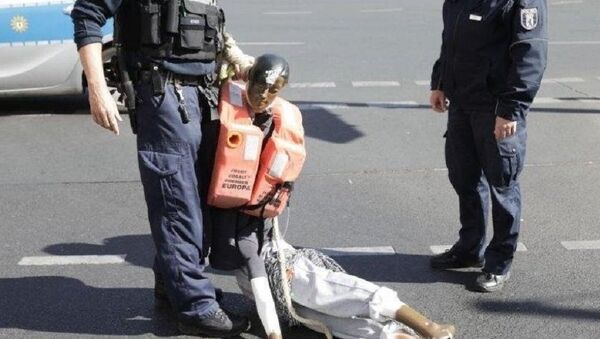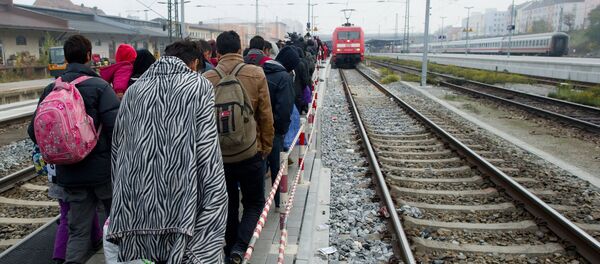On Sunday morning, firefighters pulled a dummy dressed to resemble a drowning refugee off a crane in Berlin's Hermannplatz, Deutsche Welle reports.
The hanging doll, which was tied to the crane with a rope, has apparently crept out the locals, who called police fearing that it was a real person. Police reportedly called in firefighters after facing difficulties with reaching the doll, which was hanging high above the ground.
Eine von einem Kran hängende Puppe hat in Neukölln für einen Feuerwehreinsatz gesorgt. Passanten dachten, ein Mensch habe sich getötet. https://t.co/NX9yXpyrH3 pic.twitter.com/8XIjffGYy5
— Morgenpost/Berlin (@Berlin_Ticker) 26 августа 2018 г.
The dark-colored mannequin was dressed in an orange rescue vest, similar to those given to refugees picked up by NGO-operated boats in the Mediterranean on the way to Europe. The finishing touch to the prank was a white banner, attached to the crane next to the mannequin, which read "Humanity."
The mannequin supposedly was part of a protest in support of migrant rescue missions in the Mediterranean, a police spokesman was quoted as saying by DW.
Eine makabere Aktion hat heute Morgen am #Hermannplatz in #Neukölln für Aufsehen gesorgt. Dort hing etwas an einem Baukran, das wie ein Mensch aussah. Und sich dann als eine Schaufensterpuppe herausstellte. Da ein politischer Hintergrund vermutet wird, ermittelt der Staatsschutz. pic.twitter.com/QiGsgcN3nW
— rbb Abendschau (@rbbabendschau) 26 августа 2018 г.
In July, thousands of people joined demonstrations in German cities, including Berlin, to protest against the European refugee policy and support volunteer groups that help rescue refugees in the Mediterranean.
The protests took place a week after the EU leaders agreed to set up so-called "disembarkation platforms" in North Africa to discourage those fleeing to Europe from boarding smuggling boats, and to create migrant processing centers within the bloc.
The deal calmed down diplomatic tensions in Europe, which were sparked by the new conservative Italian government's decision to bar refugee ships from its ports. In June, the Aquarius, an NGO-operated rescue vessel, was forced to dock in a Spanish port after Malta turned the ship away.
In 2015, Germany allowed entry to nearly 900,000 illegal immigrants, following Chancellor Angela Merkel's open-door policy. This year, Berlin has sought to avoid a repeat of the migration crisis. In order to tackle illegal migration, the German interior ministry established ‘transfer centers' and ‘Anker centers' to hold and process migrants who'd entered the country illegally.



